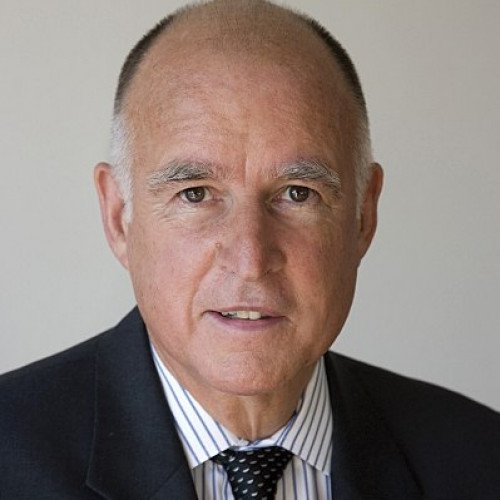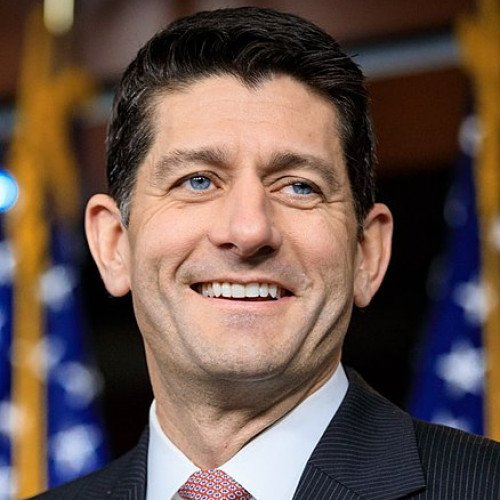Jerry Brown VS Paul Ryan

Jerry Brown
Edmund Gerald Brown Jr. (born April 7, 1938) is an American politician who served as the 34th and 39th governor of California from 1975 to 1983 and 2011 to 2019. A member of the Democratic Party, he was elected Secretary of State of California in the early 1970s; Brown later served as Mayor of Oakland from 1999 to 2007 and Attorney General of California from 2007 to 2011. He was both the oldest and sixth-youngest governor of California due to the 28-year gap between his second and third terms. Upon completing his fourth term in office, Brown became the third longest-serving governor in U.S. history, serving 16 years and 5 days in office.Born in San Francisco, he was the son of Bernice Layne Brown and Pat Brown, who was the 32nd Governor of California (1959–1967). After graduating from the University of California, Berkeley and Yale University, he practiced law and began his political career as a member of the Los Angeles Community College District Board of Trustees (1969–1971). He was elected to serve as the 23rd Secretary of State of California from 1971 to 1975. At 36, Brown was elected to his first term as governor in 1974, making him the youngest California Governor in 111 years. In 1978, he won his second term. During his governorship, Brown ran unsuccessfully as a candidate for the Democratic presidential nomination in 1976 and 1980. He declined to pursue a third term as governor in 1982, instead making an unsuccessful run for the United States Senate that same year. After traveling abroad, he returned to California and served as the sixth Chairman of the California Democratic Party (1989–1991), attempting to run for U.S. President once more in 1992. He then moved to Oakland, where he hosted a talk radio show; Brown soon returned to public life, serving as Mayor of Oakland (1999–2007) and Attorney General of California (2007–2011). He ran for his third and fourth terms as governor in 2010 and 2014, his eligibility to do so having stemmed from California's constitutional grandfather clause. On October 7, 2013, he became the longest-serving governor in the history of California, surpassing Earl Warren.
Statistics for this Xoptio

Paul Ryan
Paul Davis Ryan (born January 29, 1970) is a retired American politician who served as the 54th speaker of the United States House of Representatives from October 2015 to January 2019. He was also the 2012 vice presidential nominee of the Republican Party, running unsuccessfully alongside Mitt Romney. Ryan, a native of Janesville, Wisconsin, graduated from Miami University in 1992. He spent five years working for Republicans in Washington, D.C. and returned to Wisconsin in 1997 to work at his family's construction company. Ryan was elected to Congress to represent Wisconsin's 1st congressional district the following year, replacing an incumbent Republican who ran for U.S. Senate. Ryan would represent the district for 20 years. He chaired the House Budget Committee from 2011 to 2015 and briefly chaired the House Ways and Means Committee in 2015 prior to being elected Speaker of the House in October 2015 following John Boehner's retirement. A self-proclaimed deficit hawk, Ryan was a major proponent of Social Security privatization in the mid-2000s. In the 2010s, two proposals heavily influenced by Ryan—"The Path to Prosperity" and "A Better Way"—advocated for the privatization of Medicare, the conversion of Medicaid into a block grant program, the repeal of the Affordable Care Act, and significant federal tax cuts. As Speaker, he had a role in passage of the Tax Cuts and Jobs Act of 2017. His other major piece of legislation, the American Health Care Act of 2017, passed the House but failed in the Senate by one vote. Despite his past fiscal conservative rhetoric, Ryan's tenure as Speaker of the House—most of which coincided with a period of unified Republican control of the federal government—saw a significant increase in federal government spending and deficits. Ryan declined to run for re-election in the 2018 midterm elections. With the Democratic Party taking control of the House of Representatives, Nancy Pelosi succeeded Ryan as Speaker of the House.